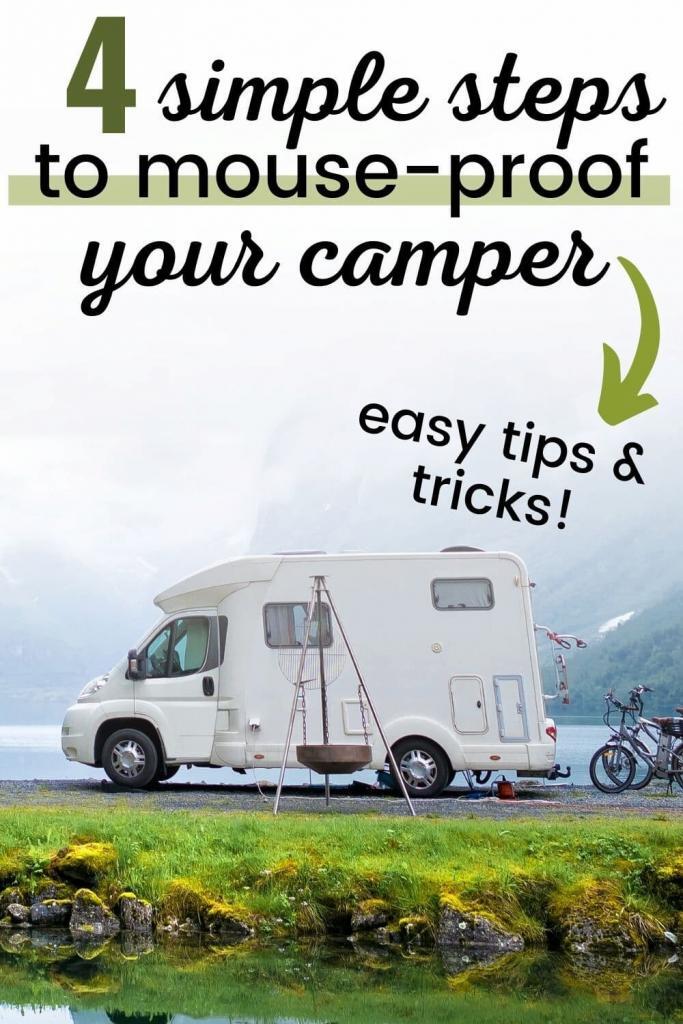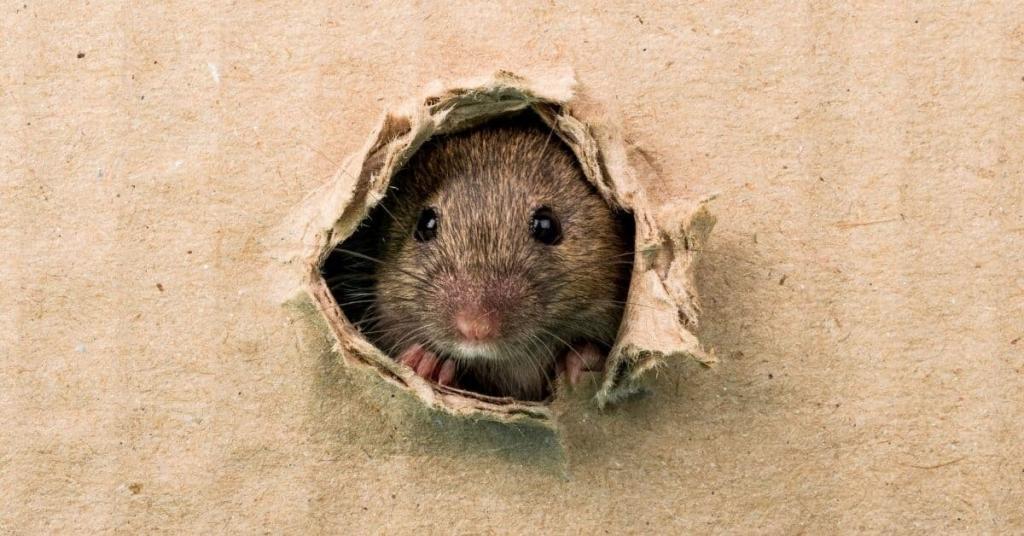Wondering how to keep mice out of your camper or RV this winter?
If you do a quick internet search you’re sure to find all kinds of suggestions for mouse repellent, but the truth is- prevention is key!
In this post, we’ll go over how to mouse-proof a camper, the best mouse deterrents, and how to clean up if pesky rodents invade your RV.
If you’re looking for easy ways to keep your camper a mouse-free zone, keep reading!
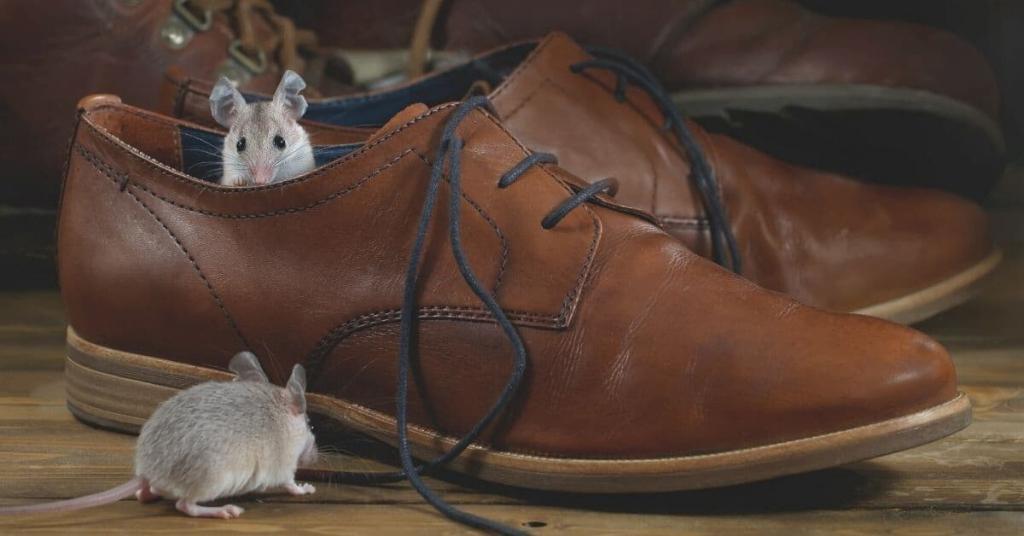
Here’s what we’ll cover….
- How To Keep Mice Out Of Your Camper
- What To Do If You Find Evidence Of Mice
- Commonly Used Mouse Repellents & Deterrents
- Health Concern Of Mice In Your RV
How To Safely Clean Your Space
FAQ’s
How To Keep Mice Out Of Your Camper
Your travel trailer or RV was an investment and you want to do everything you can to take good care of that investment, right?
Well, keeping mice and other little critters out is an essential part of that. The time you spend mouse-proofing your camper will be time well spent, believe me!
If you’ve never dealt with this problem, let me tell you, mice may be little, but they can get in through any small openings (even as small as the size of a dime!) and cause major damage to your RV.
Learning how to keep mice out of your camper and taking the appropriate steps can save you a lot of time, money, and hassle!
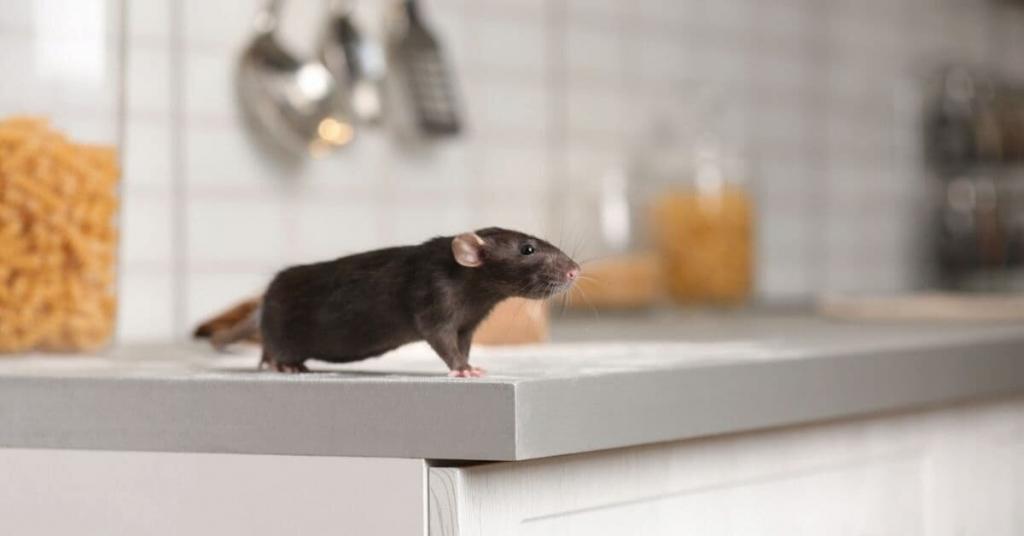
4 Steps To Keep Mice Away
Help keep mice away with these four easy steps!
1. Remove All Food And Paper Products
In between trips, or when you are getting ready to store your RV for a period of time, be sure to remove all food, paper products like toilet paper and paper towels, and anything else a mouse would eat or use to make a nest.
Also, be sure to remove items like:
- newspapers
- tissues
- birdseed
- bagged food (even unopened)
- pet food
- powdered coffee creamer
- granola bars, trail mix, baking supplies, or any other food with a long shelf life
If you want to store towels, washcloths, clothing, or other non-food items in your camper, be sure to store them in a tote with a secure, locking lid.
Mice can and will use these things to make a nest!
I would also recommend storing any dishes or silverware that you keep in your RV in a tote with a tight lid. Mice may not eat them but they can leave mouse droppings on them :/
Plus, keeping food and supplies in a tote is a really easy way to carry everything back and forth from your house to your camper when you are getting ready to take a trip.
*One more thing you may not think of- don’t forget your toaster! We have found mouse droppings in ours and had to replace it. Makes sense though, where there are food crumbs there will be mice….
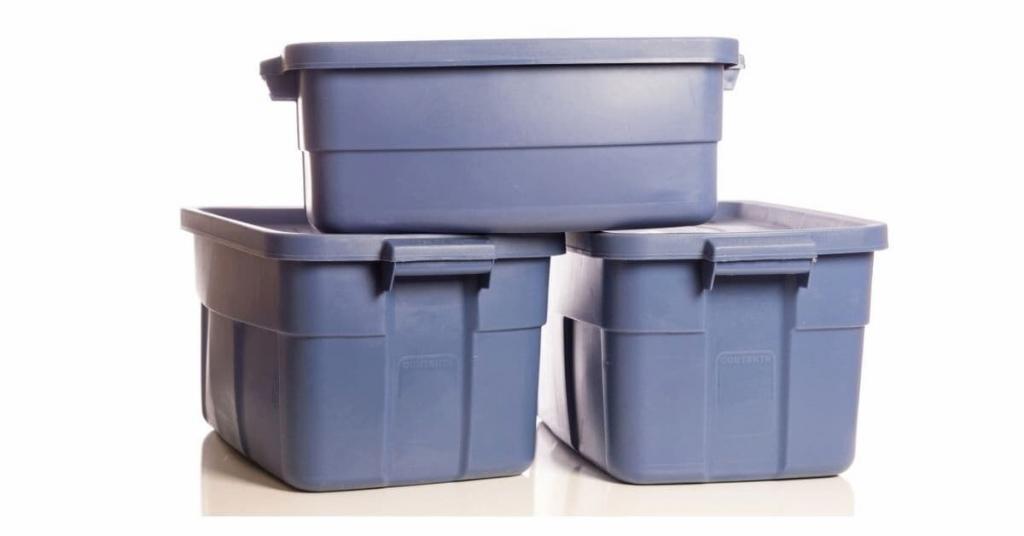
2. Clean Thoroughly
After you remove all food, paper products, and store anything else a mouse would eat or use to nest in secure totes, it’s a good idea to clean!
For best results, be sure to wipe out cabinets, clean the stovetop and oven, the refrigerator, and give the floor a good cleaning too.
The goal is to get anything and everything out that smells like food and would attract furry little creatures.
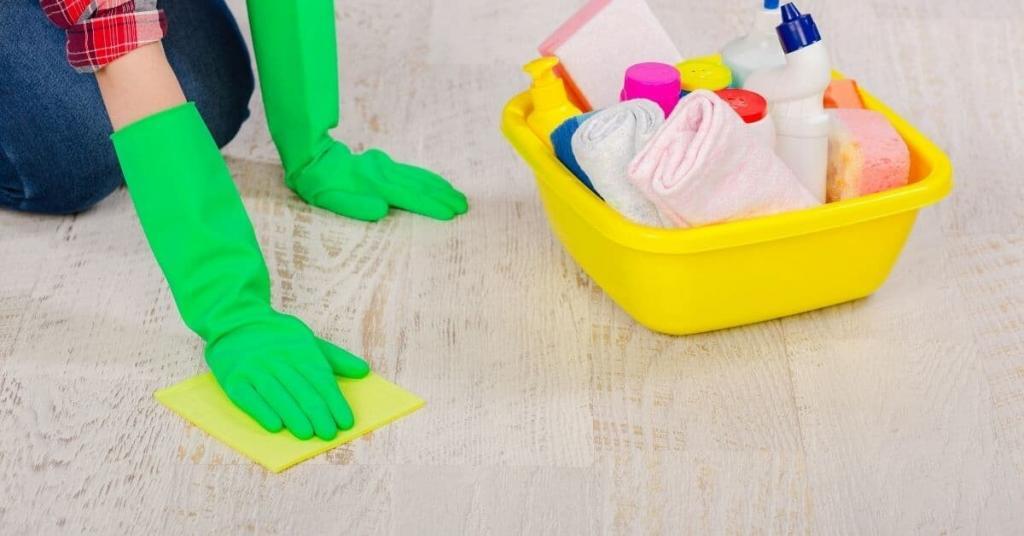
3. Plug All Holes
Mice are amazing. They can fit through the tiniest of holes, climb anything, and wreak havoc before you are even aware that they’re there!
If you’re looking for one of the best ways to mouse proof your camper, plugging all holes could be it.
To do this, you’re going to have to take a look in and around your camper for small gaps or potential entry points and fill them.
Don’t forget to look underneath your RV for small holes too!
And, if you can see a hole from a pipe or wire that goes from the outside to inside, be sure to plug it from both sides!!
*Using a flashlight while inspecting your camper is the best method for finding tiny, mouse-sized spaces. If you can have someone help you look from the inside while you shine the light from the outside, that is really helpful too!
Here are a few places to look for possible entryways:
- Cracks around doors
- Gaps or seals around slide-out
- Holes around plumbing or wiring
- Gaps in the floor
- Corners where walls meet
- Access panels for plumbing, electrical, etc.
And don’t forget to check the engine compartment and storage compartments.
So, what do you do when you see a hole or crack?
The best option is to fill it with caulk, steel wool, or spray foam. Or a combination of these materials.
If it’s a teeny, tiny hole or crack, caulk or spray foam will probably do the trick. If it has a larger opening, I would definitely use steel wool and maybe even fill around it with spray foam or caulk!
That will ensure that they don’t chew through the foam and get in anyway.
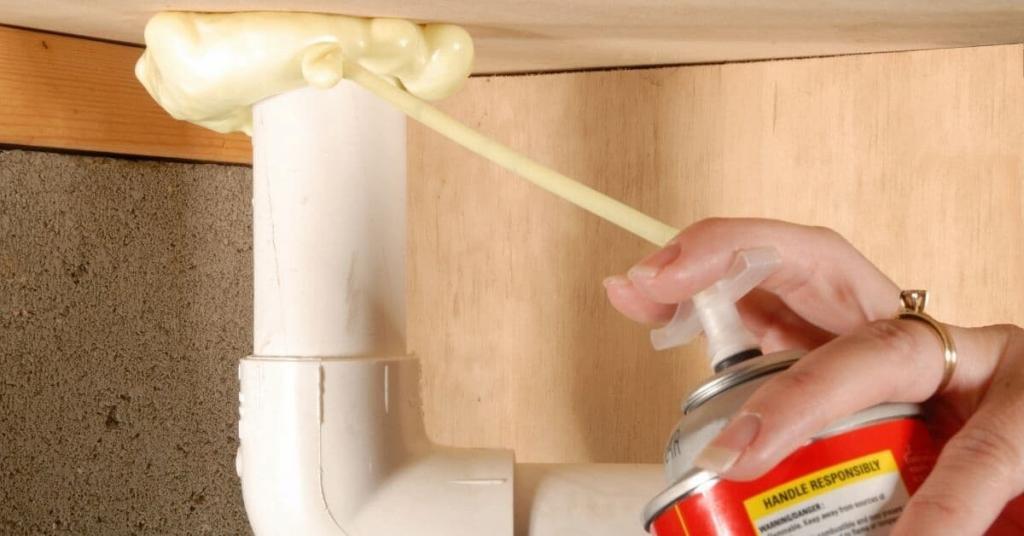
4. Secure Vents, Windows, And Doors
I know that sounds pretty basic, but you wouldn’t believe how many times we have had a roof vent not secured well and didn’t realize it until we were getting rained on (one time we had one fly off while we were driving!).
And even the smallest opening in a door or window can be enough for a mouse to get in. So, just to err on the side of caution, be sure to go around and check all doors, windows, and vents before you put the cover on or close it up for the winter months.
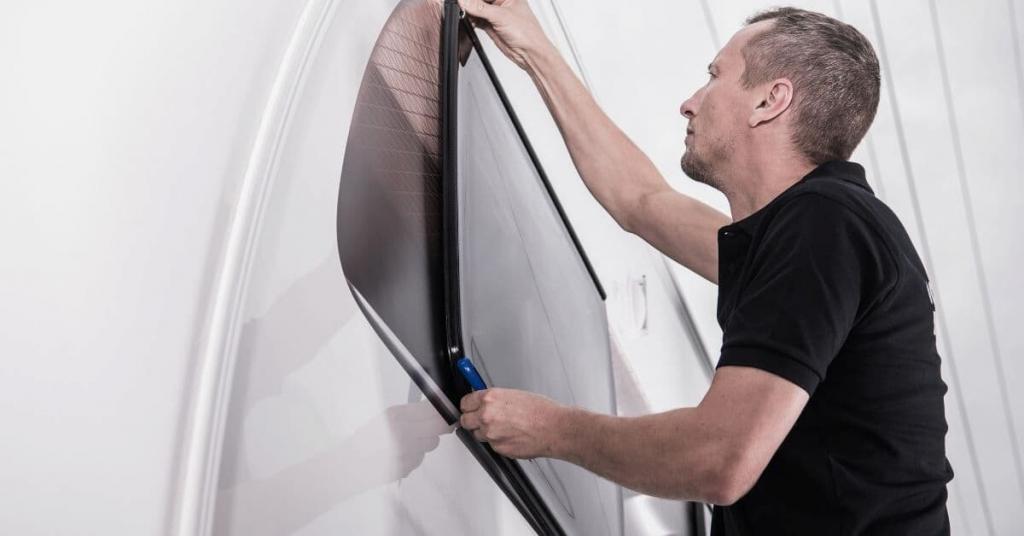
What To Do If You Find Evidence Of Mice In Your RV
Prevention is the best way to keep mice out of your camper, but if you open the door only to find evidence of mice, what can you do?
First, clean really, really well! Be sure to pay special attention and disinfect any place where a mouse has left droppings or made a nest.
Next, inspect your camper. Turn on all lights, make sure the slide goes in and out, and make sure all other electrical things are working properly. Mice love to chew electrical wiring! I don’t know why, but they do.
After everything is clean and in good working order, the next step is to get to work plugging those holes.
If you have done all that only to come back later and find that there is still evidence of mice (like droppings, holes chewed in the ceiling of your RV, or a nest in the underbelly), it’s time to take more drastic measures!
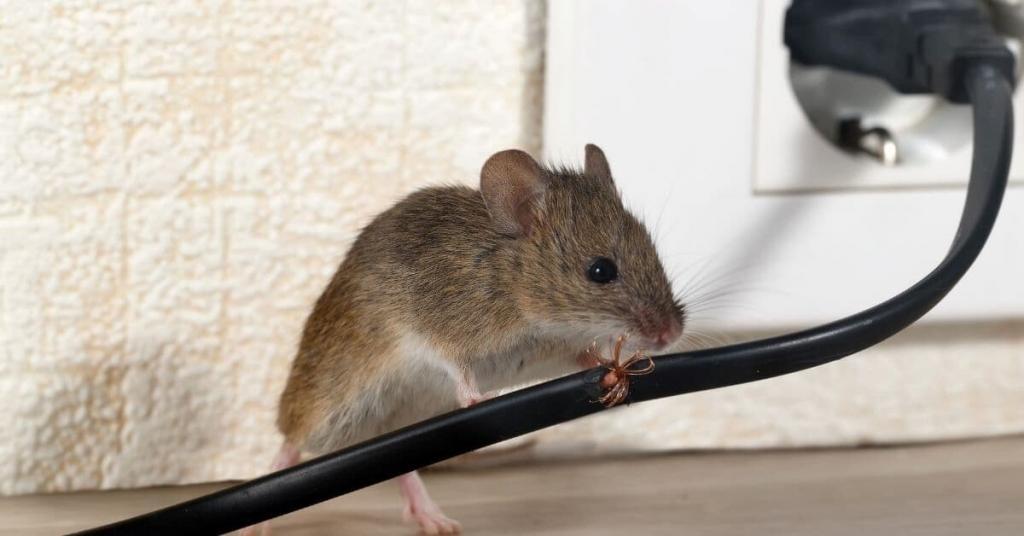
This post may contain affiliate links, which means I’ll receive a commission if you purchase through my links, at no extra cost to you. Please read full disclosure for more information.
Commonly Used Mouse Repellents & Deterrents
If you have cleaned everything out of your RV and have come to the conclusion that you still have mice or you want to deter them from coming in, here are a few options.
Some are known to work better than others, but I will include them all so you can decide what is right for your personal situation.
1. Dryer Sheets
Some camper owners swear that putting fabric softener sheets in the living space and storage area of their camper helped keep mice away. Many professional pest control companies have come out and said that this isn’t really a deterrent to mice, but I personally know people who use this method and believe it works.
The good news is that if nothing else, you will have a nice-smelling camper 🙂
2. Moth Balls
Like dryer sheets, many believe that mothballs work because they have a strong smell that repels mice. This is another method that many pest control companies do not support. In fact, mice have been known to actually walk right over moth balls so I don’t personally think this one would be a great way to deter a mouse.
Also, mothballs are incredibly toxic, known for irritating eyes and lungs, and are even linked to cancer!
I really only included this on the list because a lot of RV owners ask about it, but I hope they reconsider..
3. Irish Spring Soap Bars
There is a rumor out there that if you put bars of Irish Spring soap around your camper it will help keep mice away.
I can’t speak to everyone’s specific situation, but I can tell you that my friend tried this and the mice actually ate the soap!
It is a relatively cheap option but not guaranteed to work.
If you try it and seem to have success let me know though!
4. RV Cover
An RV cover can be helpful for keeping your camper clean, protected from the elements, and reducing maintenance costs, but some believe it can help keep mice out of your camper too.
While it may be somewhat of a deterrent because it makes entry from roof vents and windows a little more difficult, an RV cover is definitely not going to keep mice out by itself.
Remember, it is not an uncommon occurrence to have mice in the underbelly of an RV and many wires and pipes go from the underside to the inside of a camper.
And a cover will not protect those areas.
5. Poison
Mouse poison is an option that should, in my opinion, be a last resort.
While effective, it is not uncommon for the poison to be found in areas other than where it was placed.
That means that the mice take it from your camper to places where your dog, cat, or local wildlife could find and eat it.
And, if you have children you have to be VERY CAREFUL that they don’t get a hold of it.
Cleaning poison after use isn’t always easy either because it is very possible you will keep finding it (or dead mice) long after you think you were finished cleaning it up.
6. Mouse Traps
Mousetraps come in a few different varieties and have their pros and cons.
There are glue traps, no-kill traps, and traditional mouse traps with a metal lever.
The glue traps are ok if you check them daily and can dispose of or release the mouse.
No-kill traps, also known as humane traps, are an ok option. You may want to give this one a try if you feel it’s important to trap and then release or relocate the mouse. Some do not opt for this kind of trap for fear of it returning though.
And finally, the traditional mouse trap is cheap, effective and can definitely do the job, but some are hesitant or completely against killing a mouse.
No matter which you choose, mouse traps can be an effective way to remove mice from your RV.
7. Peppermint Oil (Or Other Essential Oils)
Some people swear that if you soak cotton balls with peppermint oil or a blend of essential oils and place them around your camper it is the best way to keep mice out.
Now, don’t get me wrong, I love essential oils and I don’t think using them is a bad idea, after all, they can be helpful for a lot of things, but keeping mice away may not be one of them.
The thinking is that mice don’t like the scent and the oil will work as a repellent.
There are a few things to consider though.
First, the mice may not be bothered by the oil (or at least for long). We tried this and the mice actually ate the paper towel pieces and cotton balls that we put the oil on.
Also, while a camper that smells like peppermint isn’t all bad, some essential oils (including peppermint!) are not safe for use around dogs, cats, or young kids.
So please keep that in mind when looking at your options!
8. Cornmeal And Baking Soda Mix
This 2 ingredient recipe to keep mice out of a camper is new to me but I saw it in an RV group on Facebook and had to add it to the list because there were quite a lot of people who mentioned that they had tried everything and this was the only thing that worked.
So, here’s what you do:
- Mix together equal parts of cornmeal and baking soda (1/2-1 cup of each should do the trick), making sure it is very well mixed.
- Pour some into a container (stiff muffin cups or disposable cups cut down to a small size would work and then could be thrown away after use).
- Check and refill often.
This is not necessarily a quick solution, but many have said that it does seem very effective long-term.

Really, what it comes down to is prevention! And if you need help getting the little creatures out, look over the repellent and deterrent options and see which is right for your specific situation.
Health Concerns Of Mice In Your RV
You may be asking yourself why it is such a big deal if you have mice in your RV.
Sure, it’s a little creepy to have mice running around, and it is definitely irritating if they have eaten some of your food or chewed on your silicone spatula, but is that cause for an all-out assault?
The short answer- YES!
Mice can directly or indirectly spread dozens of diseases. Many of which are very serious.
Just to really illustrate this point (although not intending to scare you in any way!) here are a few diseases transmitted by mice, according to the CDC:
- Plague
- Leptospirosis
- Hantavirus
- Various forms of Hemorrhagic Fever
- Lyme Disease
- Scrub Typhus
And many, many more!
YUK!
How To Safely Clean Your RV If You Have Had Mice
If you’ve found evidence of mice in your camper and have taken steps to remove or repel them, be sure to wait a week or so (to make sure they are actually gone) and then start the cleanup process.
Safety steps to follow when cleaning up after mice or other pests:
- Open the windows for about 30 minutes to air out the space
- Be sure to wear gloves before touching anything that may have droppings or be contaminated
- Use a disinfectant or a solution of bleach and water on any droppings or urine spots
- Let the cleaner sit for about 5 minutes before wiping up
- Use paper towels or other disposable cleaning products and deposit in a bag that will be immediately tied and thrown away
- If you find a nest or dead mouse use a paper towel to pick up the material or mouse and seal it inside a bag. Then place inside another bag and take to an outside garbage if possible.
- Be sure to disinfect all hard surfaces in your camper including countertops, floors, drawers, and cupboards
- If there is a serious infestation or evidence of mice on furniture you may want to steam clean all upholstery
- Don’t forget to wash all bedding, curtains, clothing, or any other material that may have been in the RV
- Finally, remove gloves and dispose of them in a plastic bag that you tie tight. Wash hands thoroughly!
As you can see, cleaning up after a mouse (or a few mice) is quite an ordeal!
But it is an important step that you want to make sure you do properly for health and safety reasons, and because with a sparkling clean RV you will have less chance of attracting mice (although it is certainly still possible to have them anyway!).
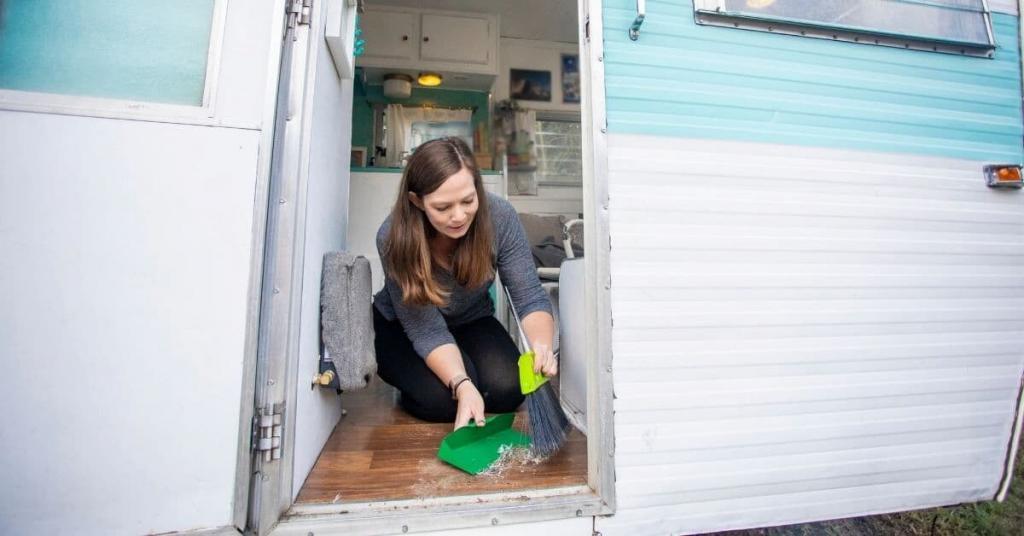
FAQ’s About How To Keep Mice Out Of Your Camper
1.I know there are mouse traps but are there humane ways to get rid of mice in our camper?
If you don’t want to use mouse traps you can always try repellants or deterrents like the ones listed above. I can’t guarantee that they will work for you, but some people swear by them and seem to have good luck.
2. We have plugged all of the holes we can see and cleaned really well, is there anything else we can do to keep mice out of our RV?
If you’ve plugged all holes and cracks that you can see, cleaned really well, and are still getting mice, the next thing I would consider is where you are storing your camper.
Do you park in a field or grassy areas? If so, be sure to keep the grass short or consider moving your RV to a cement or gravel area.
Believe it or not, just making this small change can actually help reduce or eliminate a mouse problem!
3. I’ve heard that outdoor lighting can help keep mice and other pests away, is that true?
I have to be honest, I have no idea. I have read that, but have never tried it. If it works I would think it would work best if you used it to keep critters away while you were staying in your camper or if you were only gone for a short time.
I can’t imagine that having outdoor lighting or rope lights under your camper would work for very long if no one was around.
And, you may not want to leave lights on long-term if you are storing your RV for the winter.
Well, here are our best tips on how to keep mice out of your camper. Hopefully, there are a few that can help you enjoy (and store) your RV mouse free!
Have a great tip or trick for keeping mice out of an RV, we’d love to hear it! Send us an email at [email protected] 😉
